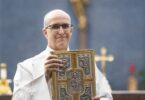
by Leon Suprenant
There have been some interesting articles in Catholic media of late asking whether permanent deacons are truly necessary.
After all, the Latin- rite church got by just fine without them for centuries. Deacons can’t celebrate Mass, hear confessions or even anoint the sick. Further, we live in the “age of the laity,” so why do we need deacons when we can empower laity to perform many of the same functions?
In calling for the restoration of the permanent diaconate, the Second Vatican Council (1962-65) and Pope Paul VI were simply going back to the church’s biblical and patristic roots.
Part of Vatican II’s methodology involved “ressourcement” — that is, a return to the authoritative sources of the Christian faith in order to find wisdom for tackling the pressing needs of today.
Surely, Pope Paul and the council fathers were aware that immediately after the selection of the first deacons, “the word of God continued to spread, and the number of the disciples in Jerusalem increased greatly” (Acts 6:7).
The early church esteemed deacons as men who served as bridges not only between the bishop (and by extension today, the pastor) and the laity, but also between the people of God and those on the peripheries of society.
One reason why the “necessity” of deacons is questioned is because of misunderstandings regarding the deacon’s rightful place in the church. Sometimes, deacons are defined by what they cannot do in relation to priests, or perceived as a stopgap for the lack of priests.
The permanent diaconate will only reach its potential when everyone appreciates the deacon’s unique identity and role.
The permanent diaconate was not restored to solve the issue of a shortage of priests, but rather a shortage of deacons.
Even among those who understand the importance of the diaconate in our time, there is the legitimate concern that deacons receive adequate formation. The faithful have the right to expect that our deacons have good interpersonal skills, that they have a firm grasp of Catholic teaching and theology, and that they have received necessary homiletic and pastoral training.
Above all, the faithful have a right to expect that our deacons have developed, with the help of sound spiritual formation, a deep interior life that enables them to pray with others.
The deacon is ordained to let go of his own ego and enter the pain of others. The deacon is never “off duty.” Out of his own intimacy with the Lord, the deacon is available and called upon to enter others’ pain at parties, in the church parking lot, at gas stations and at the water cooler at work.
Deacons are unnecessary — in fact, useless — if they are unable to share with others out of the wellspring of a deep personal relationship with Jesus. But well-formed deacons who pray are able to serve our church in unique and amazing ways!

